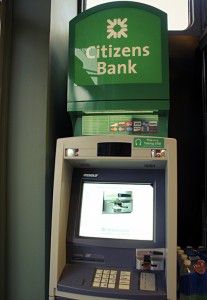
No matter how badly Bostonians need cash, they should still be wary of what types of ATMs they use, according to recent data from the Bank for International Settlements.
Debit card fraud has climbed in the past several years, with Suspicious Activity Report filings for debit card fraud increasing by about 20 percent between 2008 and 2010, according to the most recent data from the Financial Crimes Enforcement Network.
Much of that fraud comes from skimming, attaching machines that read debit cards’ magnetic strips to places where consumers swipe their cards, according to a recent Bankrate report.
Outdoor ATMs and gas stations are especially risky places to swipe debit cards, as thieves can easily place skimming devices and PIN-detecting cameras on publicly accessible machines and surveil them from a safe distance, according to Bankrate.
Using bank ATMs is much safer than using outdoor ATMs, said Trevor Gardner, a clerk at the Bank of America attached to the Boston University George Sherman Union.
“We have to check our ATMs daily to make sure that there are no skimming devices,” Gardner said. “At other outdoor ATMs, they may check every other day or once a week depending on the company’s ATM maintenance policy.”
Debit card users should be wary of ATMs in public places that police do not heavily monitor or any card-swiping devices that look beat up, according to Bankrate.
Shopping and banking online with debit cards can also be risky, said Debra Montner, a spokeswoman for the international financial security company IronKey.
About 39 percent of all computers are infected with crime ware designed to steal personal and account information, she said, and anti-virus firewalls are not always reliable to protect online bankers.
Anti-virus software fails to detect banking threats 75 percent of the time, she said, because it only protects against known viruses. Since hackers change their crime ware constantly, more secure online banking requires constant anti-virus updates.
“Everyone needs to be very alert to their personal security when using online or mobile banking,” Montner said. “Even if your bank reimburses you for losses, it is a hassle to deal with replacing your cards, restoring your directly billed online accounts and cleaning up your credit score.”
Despite reviewing bank accounts often and being vigilant about debit-card usage, several BU students said they have fallen victim to debit-card fraud recently.
“[My bank] called me and told me that there were excessive charges on my account, then they deactivated my account and got me a new card,” said Ollie Camplin, a College of Arts and Sciences junior.
Liseanne Miller, a College of Fine Arts junior, said her friend had a similar story, when her debit card information got stolen abroad.
“One of my friends in Italy last spring used her debit card at a store and then all these charges came up afterwards,” Miller said. “Someone scanned the information.”
This is an account occasionally used by the Daily Free Press editors to post archived posts from previous iterations of the site or otherwise for special circumstance publications. See authorship info on the byline at the top of the page.




Hey there I am so glad I found your blog page, I really found you by error, while I was searching on Google for something else, Anyhow I am here now and would just like to say kudos for a remarkable post and a all round entertaining blog (I also love the theme/design), I don’t have time to look over it all at the moment but I have bookmarked it and also added in your RSS feeds, so when I have time I will be back to read a lot more, Please do keep up the great work.